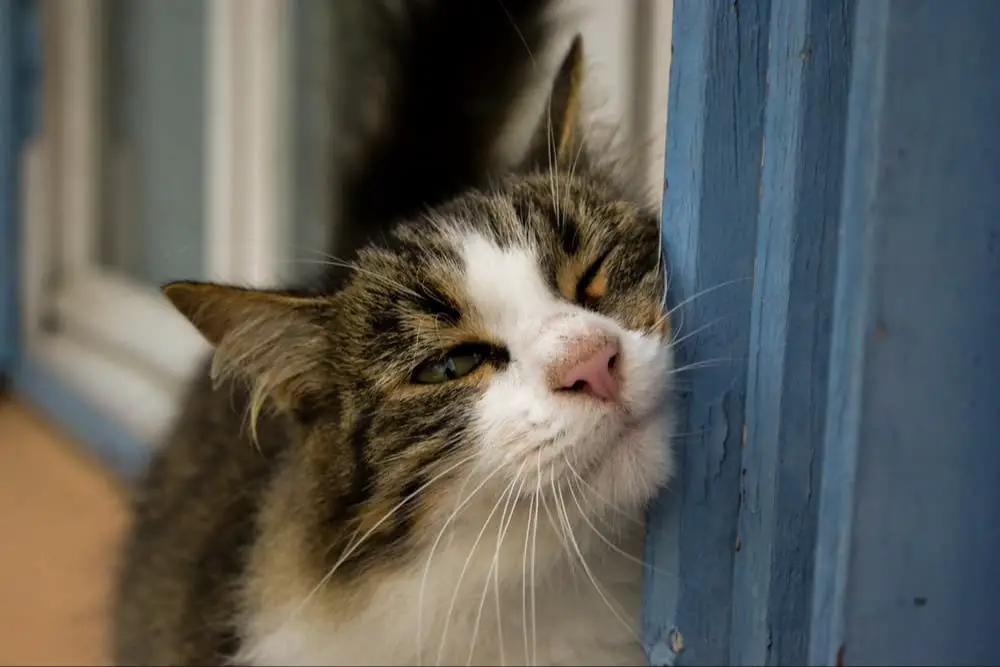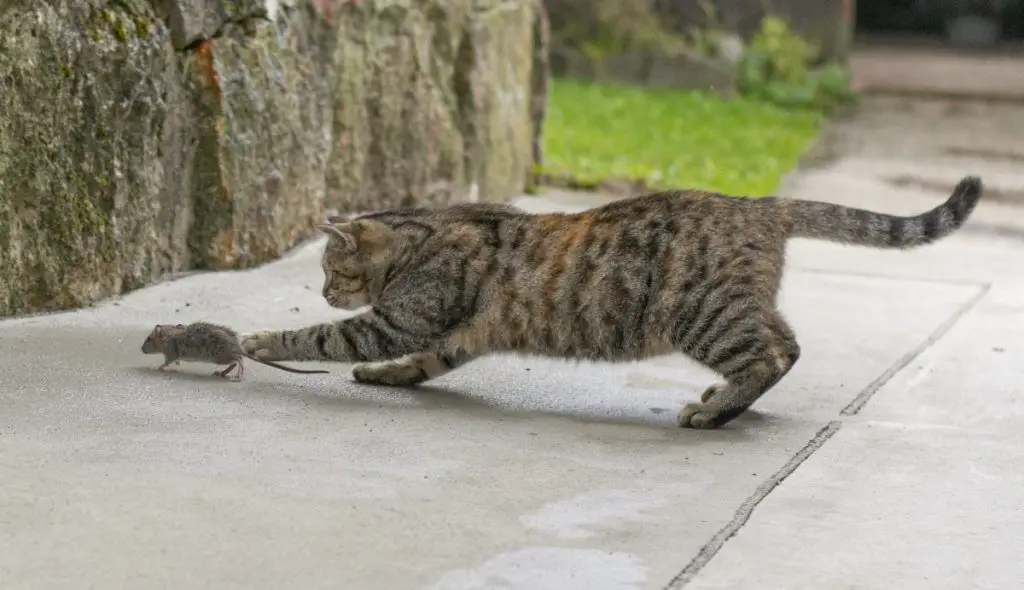Mice can pose significant problems when they invade homes and other buildings. They contaminate food, cause structural damage by gnawing, and spread diseases. Many homeowners rely on cats as a natural way to deter mice and keep them away. The hunting instincts and stealthy nature of cats make them adept mouse catchers. While cats may not completely eliminate a mouse problem, they can be an effective part of an integrated pest management plan. This article will explore how cats can deter mice, the best cats for catching mice, limitations, and additional rodent control methods to use along with cats.
Reasons Mice Come Near Homes
Mice are primarily attracted to homes in search of food and shelter. According to Suburban Pest, mice come inside seeking warmth, food sources, clutter to hide in, and entry points like cracks and openings [1]. Mice can survive on very small amounts of food, so even crumbs and scraps left in your home can attract them.
Common food sources that appeal to mice include meat, cheeses, chocolate, peanut butter, and berries [2]. Bulk packages of dry goods like paper towels, napkins, and toilet paper also make attractive nesting sites [2]. Clutter and storage areas provide shelter for mice to build nests and reproduce.
Mice can squeeze through very small openings, so any cracks in your home’s foundation, gaps around pipes, torn screens, and tiny holes inside cabinets allow access. Keeping your home well-sealed is important to prevent mice from invading in search of necessities like food and nesting grounds.
Risks and Dangers of Mice Infestations
Mice infestations can pose significant risks and dangers to health and property. According to WebMD, mice may carry dangerous bacteria like salmonella on their bodies that can easily contaminate food sources and kitchen surfaces (1). Mice droppings and urine can also spread diseases. Hantavirus, a rare but dangerous respiratory disease, is spread through contact with infected mice urine, droppings, or nesting materials. Lymphocytic choriomeningitis, a viral infectious disease, is also spread through mice droppings and urine contamination.
In addition to health hazards, mice cause considerable property damage. Mice have strong teeth and they chew through various household materials including wood, drywall, wiring, and insulation. Their gnawing and nest building inside walls can cause electrical shorts and fires. Rodents also chew through stored food containers and cardboard boxes. They soil foodstuffs with their droppings and urine. Mice reproduce rapidly, so populations can quickly get out of hand if infestations are not controlled early. Extensive damage to property can occur in a short period of time once mice invade a home.
(1) https://www.webmd.com/a-to-z-guides/know-about-house-mice
How Cats Deter Mice
Cats are excellent hunters and their strong predatory instincts make them highly effective at deterring mice. When a cat is present, mice can detect this and will avoid the area.
One of the main ways cats keep mice away is through scent marking their territory. Cats have scent glands in their paws and facial area, and they spread their scent by rubbing up against objects. This leaves behind chemical cues that signal to rodents that a predator cat lives there [1]. Mice have a strong sense of smell and these powerful feline scents alone are sometimes enough to scare them off.

In addition, cats are patient hunters and even just the sound or sight of a cat stalking or pouncing can frighten mice away. Cats by nature will patrol areas and lie in wait quietly for prey. Their stealth actions and determination when hunting means mice will not feel safe co-existing in homes or yards where cats roam.
So both the physical presence of cats and the territorial markings they leave behind combine to deter mice from wanting to approach and infest an area. However, cats have limits on how well they can control mice populations, especially for severe infestations.
Cat Breeds Best at Catching Mice
Certain cat breeds tend to be more effective hunters and mousers than others. This is often due to traits like speed, agility, high energy levels, strong prey drive, intelligence, and sharp senses. Some of the best mousers include:
Maine Coons – One of the largest domesticated cat breeds, known for their excellent hunting skills, intelligence and adaptability. Their size, speed and agility make them adept mousers (source).
American Shorthairs – An active, muscular breed with a strong prey drive. They are patient hunters and persistent in chasing mice (source).

Savannah Cats – A hybrid breed that keeps the strong prey drive of their African Serval ancestors. They are energetic, intelligent hunters (source).
Japanese Bobtails – Agile, energetic cats with excellent vision, hearing, and paw coordination ideal for catching mice (source).
In general, an active, energetic cat with a strong predatory instinct, quick reflexes and agility will likely make the best mouser. Proper training and encouragement can also develop mouse catching skills in cats.
Tips for Using Your Cat for Pest Control
If you already have an outdoor cat, there are some things you can do to encourage their natural rodent hunting instincts and make them more effective for pest control:
- Make sure your cat has access to potential problem areas where mice or rats may enter the home, like crawlspaces, attics, basements, garages, or storage sheds. Use cat doors or windows so they can freely enter and patrol these spaces.
- Provide interactive cat toys like feather wands or motorized mice for “hunting practice” playtime. This activates their predatory drive.
- Consider using plastic balls with bells inside that entice cats to bat them around and mimic prey. The jingle bell noise can also frighten rodents.
- Ensure your cat is up to date on vaccines and preventative flea/tick medication. Rodents can transmit diseases and parasites.
- Make sure your cat is spayed/neutered. Intact cats tend to roam farther from home which makes them less likely to hunt around your property.
- Provide a litter box, food, water, toys, scratching posts, and resting areas to encourage your cat to stick close to home.
With some preparation and encouragement, many cats can become quite skilled at catching and deterring mice, rats, and other pests from getting into your home!
Limitations of Cats as Pest Control
While cats can be very effective hunters, there are some limitations to relying solely on your cat for mouse control:
Cats alone often cannot eliminate a major mouse or rodent infestation. According to Petcarerx.com, “If you have a serious mouse problem with nests and entry points, relying solely on your cat’s hunting skills likely won’t be enough.” Significant infestations usually require integrated pest management using both nonlethal deterrents and humane traps to fully eliminate the issue [1].
Some mice may be too clever or careful to be caught by a cat. Mice have good survival instincts and some may learn to avoid cats or restrict activity to when the cat is away, as noted by Midway Pest Management [2]. Persistent mice can require additional pest control methods.
Cats also may not catch and kill mice humanely. Allowing cats to torture mice before killing them raises animal welfare concerns. Using humane traps can allow trapped mice to be released unharmed away from the home.
For these reasons, while cats can help control mice, owners should not rely on their cats alone to solve a mouse problem. Integrated pest management with multiple control methods is usually needed for complete control.
Other Natural Rodent Control Methods
Some other natural ways to deter mice without using harmful chemicals include:
Peppermint oil – Mice dislike the strong smell of peppermint oil. You can soak cotton balls in peppermint oil and place them along baseboards, under appliances, and near entry points to repel mice. Some studies show peppermint oil is effective at driving away rodents. One option is to make a homemade spray by adding 15-20 drops of peppermint essential oil to a spray bottle filled with water. Spray it around potential mouse entryways.

Tackle entry points – Seal any cracks, holes, or gaps inside and outside your home that are larger than 1/4 inch. This will prevent mice from squeezing inside. You can use steel wool, caulk, foam sealant, or other materials. Pay special attention to areas around pipes, vents, windows, and doors. Properly sealing entry points is crucial for keeping mice out long-term.
Cleaner home – Ensure there are no food crumbs or spills for mice to eat. Keep your kitchen very clean, store food in sealed containers, and take out the garbage regularly. Reducing available food sources helps deter mice.
Natural repellents – Place bags of mothballs, ammonia-soaked cotton balls, or vinegar soaked rags in areas prone to mice. The strong smells naturally repel mice. However, these methods may need to be reapplied frequently.
Plants like peppermint, lavender, and garlic planted around the home may also help repel mice.
When to Call a Professional Exterminator
If you have tried using natural pest control methods but are still experiencing a large infestation of mice that continue returning, it may be time to call in a professional exterminator. Signs that indicate you likely need professional help include:
- Seeing multiple mice regularly over time, even after attempting other control methods
- Noticing mouse droppings frequently around the home, especially in kitchens and pantries where food is stored
- Hearing sounds of mice scratching or gnawing inside walls and baseboards
- Finding damaged food packages with small chew holes
- Detecting a musky, urine-like odor from mouse infestations in hard to reach areas
Professional exterminators have access to stronger chemical poisons and bait stations that mice are more likely to eat from than homemade solutions. They also know the best placement strategies to fully eradicate mice from your home. Calling an exterminator is recommended if mice keep returning and natural deterrents have not worked (source). An exterminator can find any entry points mice are using and seal them to prevent future infestations.

Conclusion
In summary, mice may try to enter homes looking for food and shelter, especially in colder months. An infestation can pose health risks through disease, contamination, and structural damage. Cats can be an effective natural deterrent, thanks to their patient hunting skills and keen senses. Breeds like Siamese and Domestic Shorthair are especially adept mousers. With some training and encouragement, many cats will gladly patrol for mice and keep them away. However, cats have limitations and may miss some invaders. Integrating cats with other humane deterrents like natural repellents provides extra protection. But serious large-scale mouse problems often require professional pest control. By understanding why mice come, how cats deter them, and proper prevention, you can protect your home from these pesky invaders.

